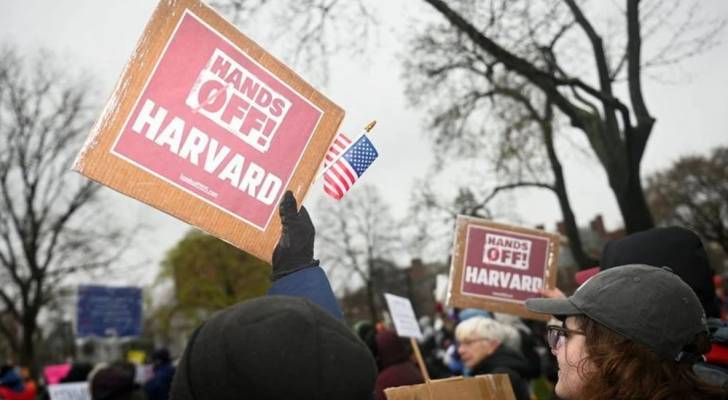Demonstrators rally on Cambridge demanding to resist interference at the university by the federal government. April 12, 2025
Full details: Harvard pushes back against US administration's demands
US Department of Education announced Monday it is freezing nearly USD 2.3 billion in funding to Harvard University.
The move follows Harvard’s refusal to comply with sweeping federal demands targeting campus protests, diversity programs, and academic autonomy.
"The Joint Task Force to combat anti-Semitism is announcing a freeze on USD 2.2 billion in multi-year grants and USD 60 million in multi-year contract value to Harvard University," the department stated. The action marks the most aggressive step yet in the administration’s campaign to reshape higher education policy in the name of combating antisemitism.
Read more: Trump freezes $2.2 billion in funding to Harvard
The funding freeze comes just hours after Harvard President Alan Garber publicly rejected a proposed agreement from the administration. In a letter addressed to the university community, Garber warned that the demands would allow the federal government to "control the Harvard community" and infringe on the university’s constitutional rights.
“Some demands may be framed as targeting antisemitism,” Garber wrote, “but the majority represent direct governmental regulation of the intellectual conditions at Harvard.”
The Education Department’s proposal reportedly required Harvard to:
- Audit the ideological views of students, faculty, and staff
- Eliminate all race-based preferences in hiring and admissions by August
- Screen international students for “hostility to American values”
- Reduce the influence of individuals “more committed to activism than scholarship”
- Submit to oversight from an external panel tasked with ensuring “viewpoint diversity”
- Garber stated that Harvard would not negotiate over its independence or First Amendment protections.
The administration swiftly responded, accusing Harvard of clinging to an “entitlement mindset” and failing to uphold civil rights laws. “The harassment of Jewish students is intolerable,” the task force said in a statement. “Elite universities must commit to meaningful change if they wish to continue receiving taxpayer support.”
The clash reflects a growing confrontation between elite universities and the Trump administration, which has adopted an aggressive posture toward what it sees as left-wing academic institutions. Since returning to office, President Trump has made targeting campus protests and diversity programs a top priority, citing what he calls a surge of antisemitism linked to pro-Palestinian activism.
Last month, the administration launched a review of USD 9 billion in federal funding tied to Harvard, and similar scrutiny is being applied to other Ivy League institutions. Columbia University, facing its own legal battle, has already had USD 400 million in funding frozen. Reports suggest the White House may soon impose a legally binding consent decree on Columbia.
Federal authorities have also begun deportation proceedings against foreign students involved in pro-Palestinian protests and revoked visas for hundreds of others.
The situation at Harvard escalated in January when the university agreed to increased protections for Jewish students in response to two lawsuits accusing it of tolerating antisemitism. But the administration’s latest demands go far beyond those terms.
In an effort to offset potential losses from the funding freeze, Harvard is seeking to borrow USD 750 million from Wall Street.
As legal challenges mount and more universities push back, the fight over free speech, academic freedom, and federal oversight is likely to intensify in the months ahead.




